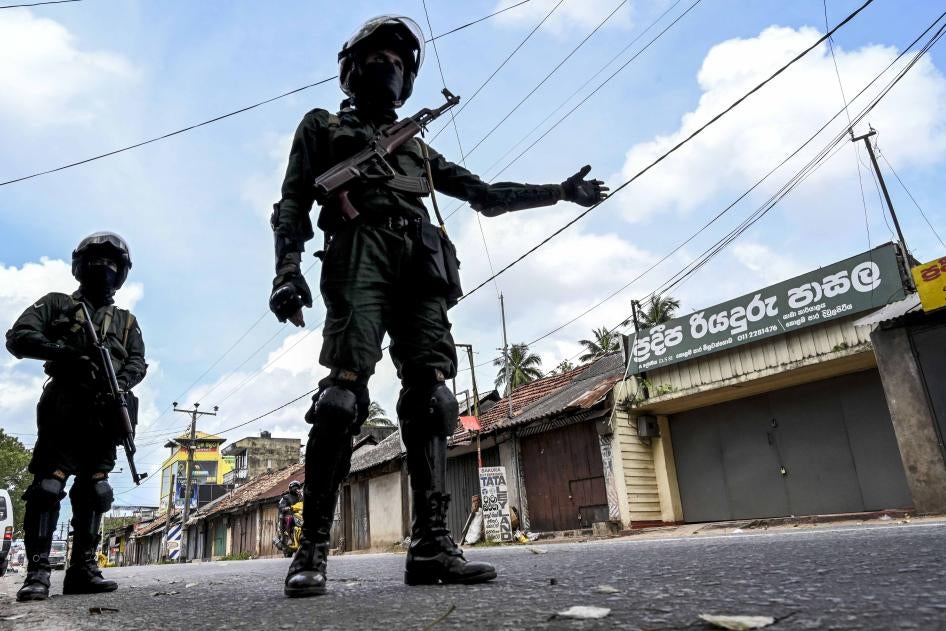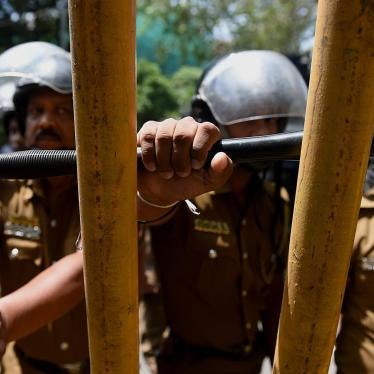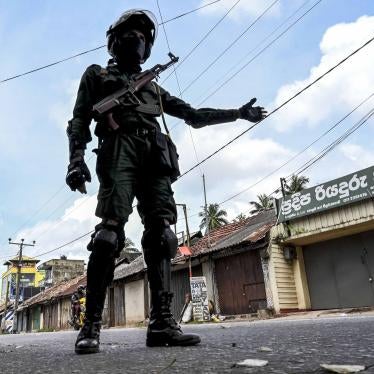(Brussels) – The Sri Lankan government is using the discredited Prevention of Terrorism Act (PTA) to commit prolonged arbitrary detention and torture, Human Rights Watch said in a report released today. The European Union, other trading partners, and donors, should press for time-bound action to repeal the abusive law and reject the government’s proposed amendments, which would not end widespread abuses.
The 59-page report, “In a Legal Black Hole’: Sri Lanka’s Failure to Reform the Prevention of Terrorism Act,” documents the Gotabaya Rajapaksa administration’s misuse of the PTA against the minority Tamil and Muslim communities, and to suppress civil society groups. The administration rejected pledges by the previous government to repeal the law after it was readmitted to the EU’s Generalized Scheme of Preferences plus (GSP+), which grants Sri Lanka special tariff-free access to EU markets.
“Sri Lankan authorities continue to use the Prevention of Terrorism Act to sweep away targeted people’s basic rights, reneging on past government promises to repeal the law,” said Meenakshi Ganguly, South Asia director at Human Rights Watch. “Proposed government changes to the PTA appear aimed to assuage the concerns of the EU and other governments, without ending abuses.”
This report is based on Human Rights Watch research on the Prevention of Terrorism Act carried out since 2018, interviews conducted between January and December 2021, and a review of newly available court documents. Human Rights Watch wrote to the attorney general of Sri Lanka and to the Human Rights Commission of Sri Lanka, and received a response from the commission which is included in the report.
The PTA allows the authorities to arrest people without warrants for unspecified “unlawful activities,” and to detain suspects for up to 18 months without producing them before a court. This denies suspects’ basic due process rights and removes safeguards that would help protect them from abuse, effectively creating a legal black hole, Human Rights Watch said. Under the government’s proposed amendments, published on January 27, 2022, this period of detention without judicial oversight would be reduced to 12 months.
Between 1983 and 2009, during the civil war between the government and the separatist Liberation Tigers of Tamil Eelam (LTTE), the authorities used the law primarily against suspected members or supporters of the LTTE or other armed groups. Since the deadly 2019 Easter Sunday bombings by a little-known Islamist militant group that targeted churches and hotels, the authorities have used the law to arbitrarily detain hundreds of Muslims. In the past three years the authorities have arrested over 600 people under the PTA, according to Human Rights Commission of Sri Lanka data.
Many suspects have been held for years awaiting trial. Statistics indicate that most are tortured in custody, and convictions frequently rely on confessions obtained under torture. The government’s proposed amendments would leave provisions that have led to widespread torture intact, including on the admissibility of confessions to the police, and the authorities’ power to detain and interrogate suspects at any place of their choosing.
The proposed amendments would not, for instance, have prevented abuses against Ahnaf Jazeem, a 26-year-old Muslim poet, who was arrested under the act in May 2020 and accused of promoting “religious extremism” in a 2017 book of Tamil verse. Jazeem testified in a July 2021 Supreme Court affidavit that police interrogators threatened “to hang him from the roof and beat him.”
After 18 months in PTA custody, when he was released on bail, Jazeem told journalists that the police denied him proper food and the use of a toilet, kept him in handcuffs, and initially refused him legal counsel. “They forced me during this time to deliver a confession,” he said. “They threatened me saying that they would keep me in prison for 15 or 20 years.”
Hejaaz Hizbullah, a prominent Muslim lawyer, was arrested under the act in April 2020, accused of aiding the Easter Sunday suicide bombers. While the initial allegations were dropped, the police made new allegations under the act of causing “communal disharmony” to extend his custody. Students alleged that police coerced them to testify that Hizbullah incited violence at a school. He remained in custody at the time of writing.
The Rajapaksa administration has used the PTA to detain or intimidate the families of victims of past abuses, human rights activists and lawyers, and journalists. “When we talk to the families of the disappeared, they say they can be arrested at any time,” said an activist working with the Tamil community. “Police are arresting people for posting pictures on Facebook. They can arrest you for anything.”
The EU had removed Sri Lanka from GSP+ in 2010 amid rights violations at the end of the civil war, but readmitted the country in 2017 after the then-government renewed commitments to adopt and implement 27 human rights and other international conventions, and in particular to repeal the PTA. This followed a consensus resolution of the United Nations Human Rights Council in 2015, in which Sri Lanka agreed to ensure accountability and reparations for war crimes, to investigate enforced disappearances, and to repeal this law. Most of these pledges have yet to be fulfilled.
In June 2021, the European Parliament adopted a resolution calling on the European Commission to “push for advancement on Sri Lanka’s human rights obligations and demand the repeal or replacement of the PTA” when assessing Sri Lanka’s eligibility for GSP+ status. A review is currently underway, and is expected to be completed later this year.
The government’s proposed amendments to the PTA were published two weeks ahead of a meeting with the EU to examine Sri Lanka’s compliance with obligations under GSP+. The Rajapaksa government has since early 2021 pledged to review provisions of the act. Yet, the government introduced an ordinance in 2021 that would make the law even more abusive. Proposed changes to the Code of Criminal Procedure would also further undermine human rights protections.
Before enacting any counterterrorism law, the Sri Lankan government should conduct meaningful and inclusive consultations with civil society groups and adopt the “necessary prerequisites” set out in December 2021 by seven United Nations human rights experts for meeting Sri Lanka’s international human rights obligations, Human Rights Watch said.
The UN experts noted that the PTA contradicts Sri Lanka’s obligations under several international human rights conventions. Sri Lanka’s participation in GSP+ includes a commitment to implement these conventions. The proposed amendments do not bring the PTA into compliance with international law under any of the benchmarks set out by the UN experts.
“The Rajapaksa administration’s abusive actions will not be addressed by its misleading proposal to amend the PTA,” Ganguly said. “The EU, United States, and United Kingdom should hold the Sri Lankan government to its international obligations and push for meaningful action to protect human rights.”








